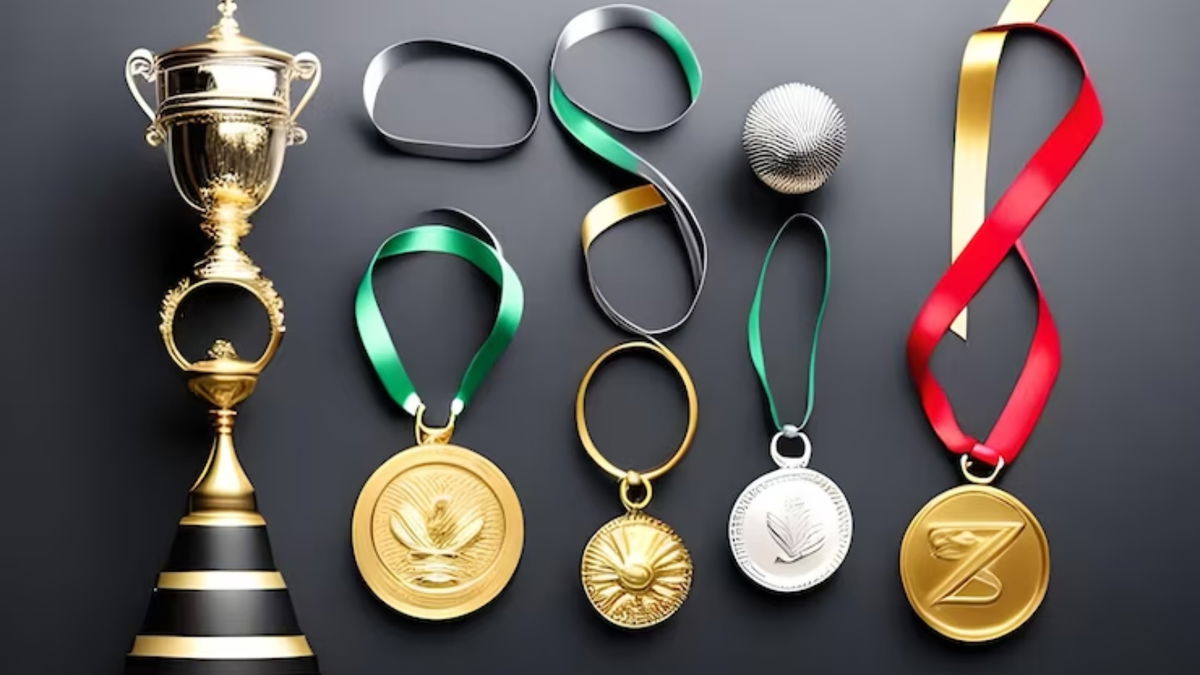

Many athletes dream of taking home Olympic glory. Every 4 years, we watch athletes sport a shiny hardware on top of the podiums. But does the phrase “all that glitters is not gold” apply to the medals won at the Summer Games? The last time an athlete clinched a pure gold medal was during the 1912 Stockholm Olympics. So does that mean every medal awarded since doesn’t involve pure gold? The short answer would be a resounding yes.
Watch What’s Trending Now!
With the Paris Olympics just 1 day away, even the Olympic medals have grabbed several eyeballs. Not only are many curious about what materials are being used for them, but many are also wondering what’s so special ab0ut them? Let’s take a look at what these reminders of being the best at your craft are truly made of.
ADVERTISEMENT
Do Olympic medals contain real gold, silver, and bronze?
No, the Olympic gold medals don’t contain 100 per cent gold. According to a set of requirements set out by the IOC, the gold medals have to be made using 92.5 per cent silver with 1.34 per cent of gold present in it. So what gives it that shiny golden glow? These medals are then dipped in pure gold plating, completing the final look! Each gold medal in Paris will weigh 529 grams approximately.
I know what you’re thinking. This means that the silver medals are entirely silver. Unfortunately, that’s not true either. While they still contain 92.5 per cent silver, the rest is pure copper. At the French capital, these medals will weigh 525 grams approximately. The bronze medals include 97 per cent copper, 0.5 per cent tin, and 2.5 per cent zinc and will weigh 455 grams approximately.
Top Stories
Cowboys Fire Defensive Coordinator Matt Eberflus: Contract, Salary, NFL Earnings & More

Ross Chastain Labels NASCAR Driver “The Most Punchable Face” to Excuse Himself Over Punchgate Controversy

10 Biggest NFL Draft Busts of the Last Decade, Including Trey Lance and Justin Fields

Andy Reid Sets Record Straight on Travis Kelce’s Chiefs Future As Retirement Question Continue to Mount

Commissioner Steve Phelps Quits NASCAR Days After Getting Exposed in Lawsuit Trial

Arman Tsarukyan Back in Play as Justin Gaethje Staph Infection Rumors Causes Fan Panic Before Paddy Pimblett Fight

ADVERTISEMENT
What are the Paris Olympics medals made of?
The 2024 Paris Olympics medals will feature a unique element. The head of design, Joachim Roncin, stated, “Having a gold medal is already something incredible. But we wanted to add this French touch and we thought that the Eiffel Tower would be this cherry on top.” Carrying a piece of Parisian history back home truly would make their wins even more special. The medals will have a hexagonal center forged out of iron from the original construction of the Eiffel Tower.
While the core will be smack dab in the middle, the rest of it will feature a depiction of Paris as the City of Light. This will be achieved with grooves starting around the center and flaring outwards. But wait, there’s more! The other side will showcase Nike, the Greek goddess of victory, with the Olympic Stadium and Athens’ Acropolis behind her. It will also feature the Eiffel Tower, truly showcasing the embodiment of the original Olympic Games.
ADVERTISEMENT
What is the value of Olympic medals?
Believe it or not, these medals have some serious monetary value! The gold medals might be worth somewhere between $750 to $850, approximately based on the materials alone. However, the value of a medal from the 2018 PyeongChang Olympics wasn’t the same. Upon being melted down, the gold medal was worth $577, the silver approximately came up to $320, and the bronze was $3.50. Shocking, right?
ADVERTISEMENT

But these medals don’t have much value until after being awarded. We have seen several instances of a few athletes selling their hard earned medals before. Wladimir Klitschko previously sold his 1996 Atlanta gold medal for $1 million. However, he later donated it to charity. Anthony Ervin sold his 2000 Sydney Olympics gold on eBay. He then donated the $17,101 to the 2004 Indian Ocean tsunami victims.
ADVERTISEMENT
When did the medals start being distributed for the Olympics?
During the ancient Olympic Games in 776 BCE, the winners would be awarded with olive wreaths instead. However, things changed during the first modern 1896 Athens Summer Games. But even then, only the first and second place victors were rewarded. While first place would receive a silver medal, an olive branch and a diploma. Second place would be bestowed with a bronze and copper hardware, a branch of laurel and a diploma.
So what did third place winners get? Nothing. They would walk away empty-handed. The familiar tradition of gold, silver and bronze medals finally made an appearance at the 1904 St. Louis Olympics. We are one day away from the Paris Olympics, and over 5,000 unique medals will be handed out at the 2024 Olympics and Paralympic Games. Are you excited for a thrilling showdown at the French capital?
ADVERTISEMENT
ADVERTISEMENT
ADVERTISEMENT
ADVERTISEMENT

